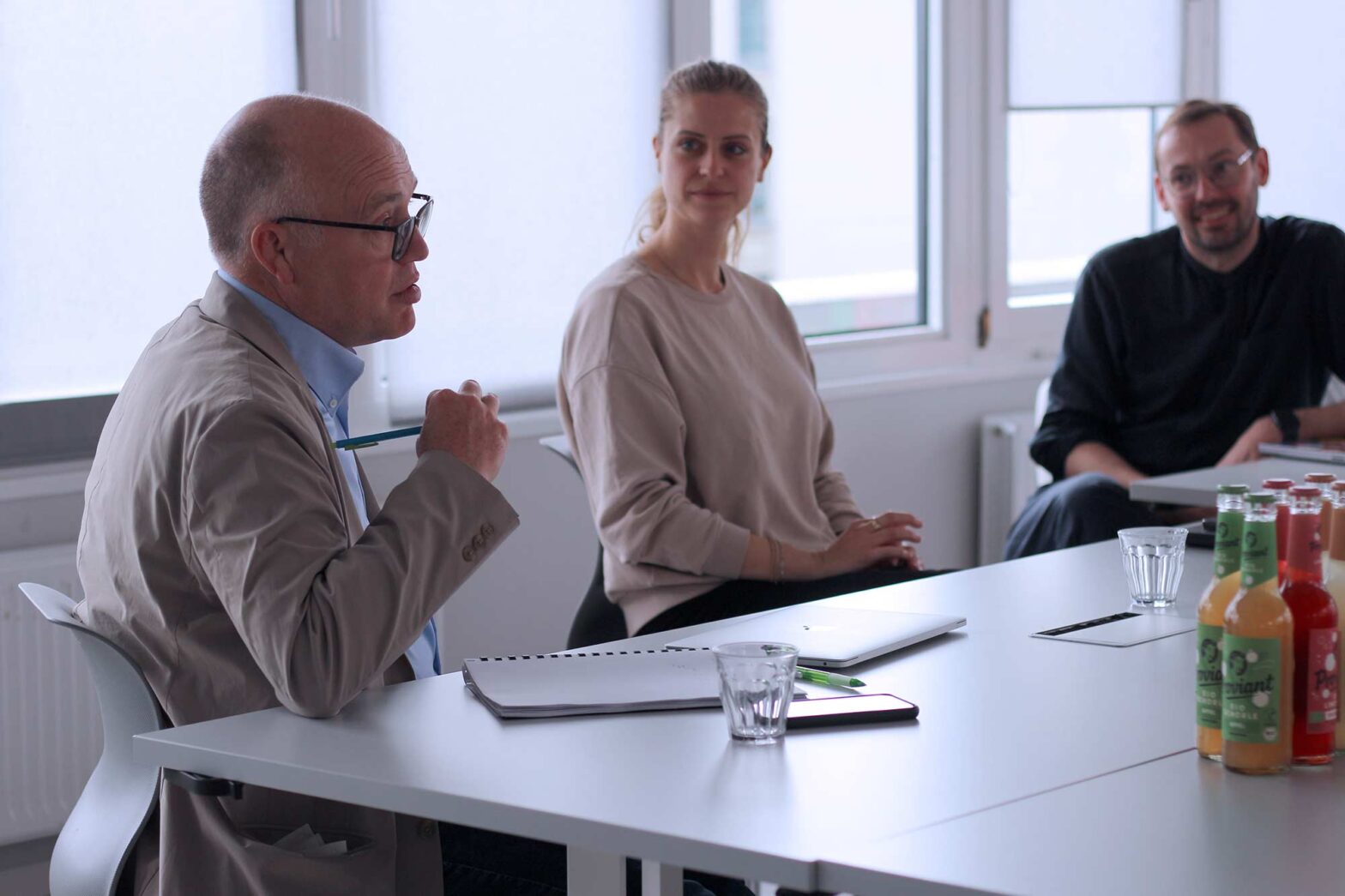On short notice, Liam Maxwell, former Chief Technology Officer of the UK Government, stopped by our office on Tuesday afternoon.
After about 3.5 years in that role, Liam left GDS the same month I joined – in April 2016. He has spent last few years heading up government transformation at Amazon Web Services (AWS). Besides sharing some UK public sector anecdotes, he talked about his cloud-enabled work with banks in Ukraine, the justice system in Brazil, and Estonia around AI-enabled data processing.
Like all large global cloud providers, they find it severely challenging to get their foot into the German public sector market. From what I got through the roundtable discussion this week, there’s more for the AWS team to understand about the German public sector’s fears, pain points, and overall culture and mindset. If they don’t understand the deeply engrained concerns, they will find it difficult to land their AWS European Sovereign Cloud that’s supposed to arrive next year.
It will be interesting to observe what happens in that space. We at Digital Service rely on cloud-first-run public services, and the more good offerings there are, the better for users of public services.
Talking straight for 3 days
For 3 evenings in a row, I wrote talks and delivered them the following day.
On Tuesday morning, I joined ‘Digitaler Morgen’, an inspirational morning format of the innovation office of the Federal Ministry for Family Affairs, Senior Citizens, Women, and Youth. I talked about hands-on user-centricity through design. As usual, my slides are up on GitHub. The session was not recorded, but if I can find the time, I’ll make a recording and put it on YouTube.
37 people from across the ministry were in the remote session. After talking for about half an hour, people kept asking questions slowly but steadily. They wanted to hear what barriers to digital public service transformation I see, how much I still learn from user research activities after various years, and how early user-centred design should get involved in policy-making. My answers, in short: Many barriers, but lack of operational quality standards and cross-organisational collaboration are the biggest; user research in every service area is different, and you literally learn entirely new things every day; there is no too-early moment for user-centred design folks to get involved in policy-making or law-writing. All of those were terrific questions, and I enjoyed answering them. I hope to follow up with folks from the ministry on the topic.
On Wednesday, over lunchtime, I followed an invitation from Google Germany’s Works Council to deliver an inspirational talk. They had an offsite where folks from their Berlin, Frankfurt, Hamburg, and Munich offices got together to reflect on their efforts. They invited colleagues from Meta’s and Spotify’s Works Councils as guest speakers—and me.
I delivered an abridged version of our ‘The long slog of public service design’ talk. I trimmed, contextualised, and retitled it: “Thinking and acting in different timeframes: How to keep going when striving for systemic change”. The feedback was positive and almost overwhelming. Their stream of questions and general praise for our work would not end. I told them when opening, we wrote the original talk for designers of slow-moving services and people transforming public services, and they’ll have to do some context translation. That was easier than I thought. I received a few more friendly messages afterwards and was overall happy that our content seemed relevant and valuable to them.
On Thursday, I joined a session of the Service Standard sounding board. There, I gave an overview of the implementation of the Service Standard in the United Kingdom. I did a bit of digging for that. Apart from countless UK government blog posts, Vicky’s post ‘A brief history of the Service Standard’, Matt’s writeup ‘What we can learn from the history of the service standard’ and James’ overview ‘Setting the standard: A short history of the Government Service Standard’ were most helpful for retracing what happened when and in what sequence.
@vickytnz.bsky.social, you have no idea how grateful I am still for your #ServiceStandard history post! I’m just digging through it once again. Thank you so much for putting this together! www.vickyteinaki.com/blog/a-brief…
— Martin Jordan (@martinjordan.com) Jun 6, 2024 at 0:40
[image or embed]
On Bluesky, Tom Loosemore and Andrew Greenway also chipped in and added missing details.
I used to say that 3 things mattered most: user needs, iteration and nothing silly (on security and accessibility). If you manage that, you can always improve on what you have…
— Andrew Greenway (@andrewgreenway.bsky.social) Jun 7, 2024 at 12:09
My slides are once again on GitHub in case someone else is interested. As various people from the German public sector are on the sounding board, the slides, including all newly drawn timelines, are in German. My input triggered some excellent discussions, with the other members immediately coming up with ideas about who else to get involved in this work.
As if 3 talks weren’t enough, Marion and I also talked to an academic researcher from the Department of Communication Studies of the Vrije Universiteit Brussel. His research topic is digital inclusion in the context of European public services. The Flemish government commissioned it, and he will talk to people in five EU countries about it. After running over time because there was so much to cover from our side, he said he was surprised that we were going beyond the compliance aspect of accessibility.
Lastly, we also talked to my former colleague Angus Montgomery, Head of Strategic Projects at the UK Cabinet Office’s Central Digital and Data Office. Anna, Jakob and I wanted to learn how they created, published and implemented their ‘Digital Readiness Check for government’. In our chat, Angus acknowledged it was a copycat of the German ‘Digitalcheck für Gesetze’, which we were pleased to hear. Once deemed good enough, they published their Digital Readiness Check, not planning too far ahead regarding its implementation. It will make plenty of sense to make the framework more than an optional offering for the UK Civil Service’s policy profession and make it a part of the set policy profession standards. Little is going to happen in the middle of the pre-election period, though. I hope we can have further exchanges over summer and autumn. There is much to discuss and share, including how they could tie the Digital Readiness Check and the Service Standard together.
Meeting new people with new formats
Starting at the beginning of June, we welcomed another new designer, Vivien. She joined us as a UX designer on one of the legal information system streams. I participated in an onboarding session for the design of the legal information system.
Clara, Christian, Jutta, and I welcomed all 6 new starters for the rewritten version of our ‘Introduction to Delivery Disciplines’. For the first time, we incorporated the delivery principles that we published last week. We collectively felt it was the best introduction we had given so far. Finally, the content feels well-rounded.

The A3 version of the delivery principles poster is up on GitHub. I made tiny tweaks based on Daphne’s feedback. To support adoption, I also made a few animations to be used as tiny reactions in Slack.
What’s next
This week wasn’t calm. But next week will be even more intense.
Apart from doing business as usual – whatever that actually is – I will co-run an NExT community of practice meeting on digital accessibility on Tuesday. We will hear from 3 different organisations: the Federal accessibility monitoring unit, the state pension provider, and Digital Service.
On Thursday, I will attend the Creative Bureaucracy Festival. This year, I am not directly involved in any activities. Instead, we are running a meetup on innovating public healthcare in the evening in the Digital Service office, 3 kilometres away from their venue.
The day before the festival, I’ll try to join the Global Government Innovators Forum for the afternoon. I am hoping to meet some more people to invite to a thing 2 days later:
Any int’l public servants in Berlin for Creative Bureaucracy Festival next week and interested in workshopping global design patterns? Join us on Friday morning, 14 June, at @digitalservice.bund.de for 3 chatty hands-on hours with 🥐. Register your interest via this form: forms.gle/XWadjtPpc1Ks…
— Martin Jordan (@martinjordan.com) Jun 4, 2024 at 19:56
[image or embed]
Piggybacking on the festival and expecting many interesting people again in Berlin, we are running a global design pattern workshop. Laurence, who continues working for governments around the world; Betty, who worked for GIZ in the past and is now with GDS; and I planned the workshop on Friday. We have sign-ups from several people, including Argentina and Brazil.
On Friday afternoon, I am also supposed to participate in a working session on the digital strategy of the federal government. I will mention the Service Standard at least once there.

